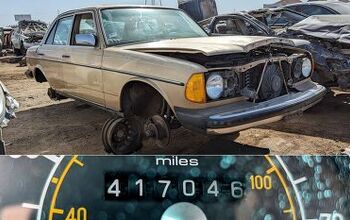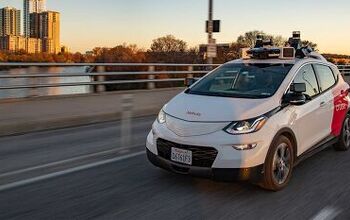ACLU Says License Plate Scanning Widespread, With Few Controls On Collected Data
TTAC has recently addressed the issue of police using scanning technology to read license plates and then store their street locations. When the story broke, it centered on a few counties in Northern California, but the American Civil Liberties Union has just released documents that show that the practice is widespread across the United States and that few of the police agencies or private companies that are scanning license plates and storing that data, making it possible to retroactively track drivers, have any meaningful rules in place to protect drivers’ privacy. There are few controls on how the collected data is accessed and used. The documents reveal that many police departments keep the information on millions of people’s locations for years, or even indefinitely, whether or not they are suspected of a crime. Data on tens of millions of drivers is being logged and stored.
ACLU Staff Attorney Catherine Crump, the report’s lead author said, “The spread of these scanners is creating what are, in effect, government location tracking systems recording the movements of many millions of innocent Americans in huge databases. We don’t object to the use of these systems to flag cars that are stolen or belong to fugitives, but these documents show a dire need for rules to make sure that this technology isn’t used for unbridled government surveillance.”
With the help of chapters in 38 states, the ACLU compiled 26,000 pages of documents based on nearly 600 Freedom of Information Act requests submitted to federal, state and local agencies, asking how those agencies use license plate readers and how they manage the data collected. Approximately 300 police departments’ policies were reviewed. According to the civil liberties group, only a minuscule fraction of the scanned plates are used to solve crimes. In Maryland, for example, only 47 out of every million plates scanned (0.005%) were even potentially associated with auto theft or a person wanted for a serious crime.
The issue is not restricted to government agencies. There’s no expectation of privacy in public and for-profit companies can also set up scanners on vehicles or in fixed locations, also without having to protect how that information is used. A firm named Vigilant Solutions has over 800 million registration plate location records. Over 2,200 police agencies, including the Dept. of Homeland Security, pay Vigilant Solutions for access to their data.
The ACLU has suggested a number of specific policies regarding license plate scanning to make sure that nobody’s rights are being infringed. Those recommendations include: that a reasonable suspicion that a crime has taken place must exist before police can examine the information, unless there is a specific legitimate reason for record retention, the scanning data should be automatically deleted within weeks, or days if possible, and people should have the right to know if their cars’ location information has been stored in a law enforcement data base.
You can read the full ACLU report here. Interactive slide show here
More by TTAC Staff
Latest Car Reviews
Read moreLatest Product Reviews
Read moreRecent Comments
- Akear Does anyone care how the world's sixth largest carmaker conducts business. Just a quarter century ago GM was the world's top carmaker. [list=1][*]Toyota Group: Sold 10.8 million vehicles, with a growth rate of 4.6%.[/*][*]Volkswagen Group: Achieved 8.8 million sales, growing sharply in America (+16.6%) and Europe (+20.3%).[/*][*]Hyundai-Kia: Reported 7.1 million sales, with surges in America (+7.9%) and Asia (+6.3%).[/*][*]Renault Nissan Alliance: Accumulated 6.9 million sales, balancing struggles in Asia and Africa with growth in the Americas and Europe.[/*][*]Stellantis: Maintained the fifth position with 6.5 million sales, despite substantial losses in Asia.[/*][*]General Motors, Honda Motor, and Ford followed closely with 6.2 million, 4.1 million, and 3.9 million sales, respectively.[/*][/list=1]
- THX1136 A Mr. J. Sangburg, professional manicurist, rust repairer and 3 times survivor is hoping to get in on the bottom level of this magnificent property. He has designs to open a tea shop and used auto parts store in the facility as soon as there is affordable space available. He has stated, for the record, "You ain't seen anything yet and you probably won't." Always one for understatement, Mr. Sangburg hasn't been forthcoming with any more information at this time. You can follow the any further developments @GotItFiguredOut.net.
- TheEndlessEnigma And yet government continues to grow....
- TheEndlessEnigma Not only do I not care about the move, I do not care about GM....gm...or whatever it calls itself.
- Redapple2 As stated above, gm now is not the GM of old. They say it themselves without realizing it. New logo: GM > gm. As much as I dislike my benefactor (gm spent ~ $200,000 on my BS and MS) I try to be fair, a smart business makes timely decisions based on the reality of the current (and future estimates) situation. The move is a good one.


































Comments
Join the conversation
Could my wife get a hold of this info? Ha Ha! Just kidding Sweetie, you know you're my one and only.
As far as solving crimes, a scanner would have to be near a crime scene and operating in and around the time the crime was committed. Not likely, unless a cruiser just happened by. Recently, in the past year, a friend of mine who was busted for growing pot in the early eighties, and spent some time in the county hoosegow, has been stopped three times and asked if he had any drugs and if they could do a search. In the past twenty years he has never been stopped for anything and has never had any kind of ticket, ever. We suspect a plate reader tagged with his record. And so it Goes......